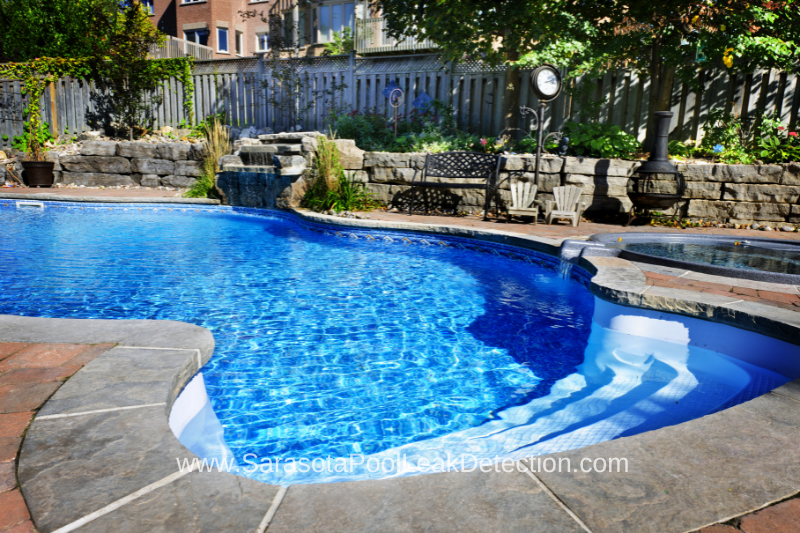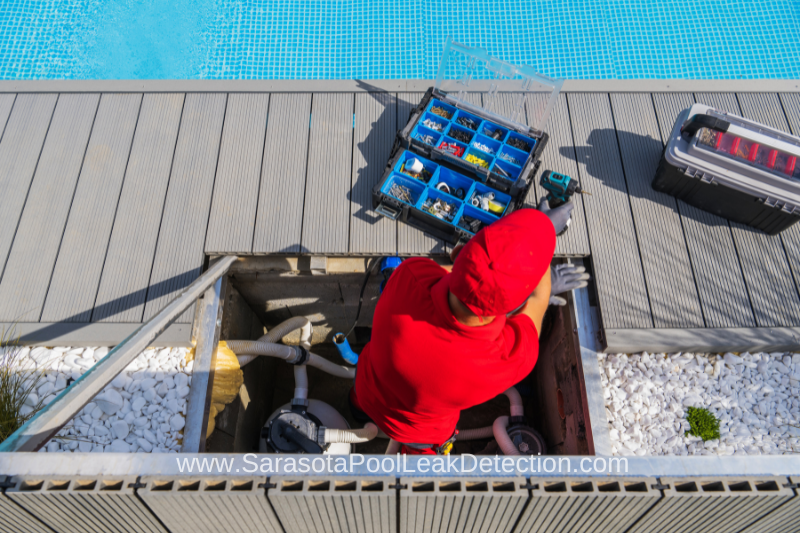Having a beautiful pool area is a source of pride for any homeowner. However, pool rocks can develop wear and tear over time, affecting your pool’s overall aesthetics and safety.
You’re in the proper place if you’re wondering how to efficiently fix pool rocks. In this blog post, we’ll explore the issues that can arise with pool rocks and provide expert tips and solutions to address them.
We’ve got you covered, whether it’s cracks, chips, or other forms of damage. You’ll have the information and resources necessary at the end of this article to bring your pool rocks back to their former splendor. So, let’s dive in and discover the best ways to fix pool rocks for an incredible and safe swimming experience.

How Do You Fix Pool Rocks?
Having rocks in your pool can be an eyesore and a potential safety hazard. Whether you’re dealing with cracks, chips, or loose rocks, it’s essential to address these issues promptly to maintain the beauty and functionality of your pool.
You can effectively address pool rock issues by assessing the damage, cleaning the area, repairing minor cracks, replacing damaged rocks, and sealing the surfaces.
Understanding Pool Rock Problems
When it comes to pool rock problems, understanding the different types of damage is essential. Here are some common types of pool rock damage you may encounter:
Cracks
Cracks can occur in pool rocks due to various factors such as ground movement, temperature changes, or excessive pressure. These cracks range from minor hairline fractures to larger, more significant fissures.
Chips and Breaks
Pool rocks are prone to chipping or breaking, especially in high-traffic areas or if heavy objects are dropped. These damages can affect both the aesthetics and functionality of the pool rocks.
Discoloration
Over time, pool rocks may become discolored due to exposure to chemicals, sunlight, or algae growth. Discoloration can make your pool area look unappealing and require attention to restore its original appearance.
Erosion
Pool rocks are constantly exposed to water and chemicals, which can lead to erosion. Gradually wearing away the rock’s surface can result in roughness or unevenness, compromising your pool area’s overall look and feel.
Understanding the causes of pool rock issues can help you prevent and address problems effectively. Here are some common causes:
Please include attribution to https://sarasotapoolleakdetection.com with this graphic.
Natural Wear and Tear
Over time, pool rocks naturally experience wear and tear due to regular use, exposure to the elements, and ongoing maintenance activities. This normal aging process can contribute to various rock problems.
Improper Installation
Pool rock issues can arise if the rocks were not correctly installed initially. Poor installation techniques or inadequate materials can lead to instability, movement, and eventual rock damage.
Chemical Imbalance
Improper water chemistry can have a detrimental effect on pool rocks. The rocks’ corrosion, staining, or erosion can be triggered by high concentrations of specific chemicals, such as chlorine or pH imbalances.
Weather Conditions
Extreme weather conditions, including freezing temperatures, intense heat, or heavy rainfall, can stress pool rocks. Constant exposure to such conditions can weaken the rocks and contribute to cracks, breaks, or erosion.
Lack of Maintenance
Neglecting regular maintenance and cleaning can exacerbate pool rock issues. Failure to address minor problems promptly can lead to more significant damage over time.
Assessing Pool Rock Damage

Before proceeding with any repairs or maintenance, conducting a thorough visual inspection of the pool rock damage is essential. Here are some techniques to help you assess the condition of the rocks:
Check for Cracks and Fractures
Carefully examine the pool rocks for any visible cracks or fractures. Pay attention to both the surface and edges of the rocks. If necessary, use a flashlight to investigate difficult-to-reach locations.
Look for Chipped or Broken Pieces
Inspect the pool rocks for any chipped or broken pieces. Check the surrounding area for any loose fragments that may have fallen off.
Examine Discoloration or Stains
Observe if there is any discoloration or stains on the pool rocks. This could indicate chemical damage, algae growth, or other underlying issues.
In addition to visual inspection, it’s crucial to identify any potential structural concerns that may affect the stability and safety of the pool area. Consider the following factors:
Stability of the Rocks
Assess whether the rocks are stable and securely in place. Look for signs of movement or shifting, which may indicate underlying structural issues.
Surrounding Support
Evaluate the condition of any supporting structures, such as concrete or mortar, that hold the pool rocks in position. Look for signs of deterioration or damage.
Pool Deck Alignment
Check the alignment of the pool deck concerning the pool rocks. If there are any noticeable gaps or unevenness, it could indicate potential issues with the foundation or base support.
Once you have assessed the pool rock damage visually and identified any structural concerns, it’s crucial to determine the extent of the damage. This will help you plan and prioritize the necessary repairs. Consider the following factors:

Measure the Size of Cracks or Chips
Measure any cracks or chips’ length and width using a measuring tape or ruler. This will provide a quantitative assessment of the damage.
Assess the Depth of Damage
Determine how deep the damage goes into the pool rocks. You will better understand the problem’s gravity and the required repair techniques as a result.
Evaluate the Overall Condition
Take a step back and evaluate the overall condition of the pool rocks. Consider whether the damage is isolated to specific areas or if it affects a significant portion of the rocks.
DIY Pool Rock Repair Methods
When fixing pool rocks alone, you can try several effective methods. These do-it-yourself approaches can help you address common issues and restore the appearance of your pool rocks. Here are some DIY pool rock repair methods to consider:
Filling Cracks and Chips
One common problem with pool rocks is the presence of cracks and chips. To fill these imperfections, epoxy resin fillers are an excellent option for small to medium-sized cracks and chips. You can achieve a smooth finish by thoroughly cleaning the damaged area and applying the epoxy resin carefully.
For larger cracks or chips, cement-based fillers work well. You can effectively repair the damage by preparing the filler mixture and applying it with a trowel or putty knife.
Patching and Resurfacing
For more significant damage or areas that require patching and resurfacing, mortar patching is a suitable technique. This method involves removing loose or damaged rocks, cleaning the area, and applying mortar mix to shape and texture it to match the surrounding rocks.
Another option is a rock overlay, which involves applying a specialized rock-like coating or veneer over the existing rocks, providing a fresh appearance and enhanced durability.
Applying Sealants and Coatings
Applying sealants and coatings is essential to protect the repaired or existing pool rocks and prolong their lifespan. Stone sealers are designed to penetrate the porous surface of rocks, protecting against water absorption, stains, and deterioration.
Concrete coatings, on the other hand, can enhance the appearance of pool rocks while offering protection against weathering and chemical damage.

Should I Hire Professionals for Pool Rock Repair?
While DIY methods can be effective for minor pool rock repairs, sometimes it’s best to leave the job to the experts. Hiring professionals for pool rock repair has several benefits that ensure a successful and long-lasting solution. Here are some reasons why you might consider seeking professional assistance:
First and foremost, professionals have the knowledge and experience to handle various types of pool rock damage. They know the best techniques, tools, and materials for effective repairs. Their expertise allows them to accurately assess the damage’s extent and recommend the most suitable repair approach.
Additionally, professionals can save you time and effort. Repairing pool rocks can take a while, especially if you’ve never done so. By hiring experts, you can free up your time and focus on other aspects of pool maintenance or enjoy your pool without worrying about repairs.
When hiring professionals for pool rock repair, there are a few factors to consider. Firstly, check the credentials and qualifications of the repair service. Look for companies or contractors with a good reputation and positive reviews from previous clients. It’s also important to inquire about their experience in pool rock repairs.

Another crucial aspect is the cost of the service. Obtain quotes from different professionals and compare them, considering both the price and the scope of the repair work offered. Remember that the cheapest option may not always provide the best quality, so balance affordability and expertise.
Lastly, choose a pool rock repair service that offers a warranty or guarantee for their work. This gives you peace of mind since any problems after the repair will be fixed without charging you more.
When it comes to pool rock repair, assessing the damage, considering DIY options, and evaluating the benefits of hiring professionals is essential. While some minor repairs can be handled independently, more significant damage or structural concerns may require expert assistance. Hiring professionals ensures the job is done correctly, saving you time and effort in the long run.
If you need pool rock repair services, don’t hesitate to ask for professional help. Call (561) 570-1269 now, and we will connect you with a trusted pool repair and renovation company in your area. They will schedule a convenient time to visit your property, assess the repairs needed, and provide you with a comprehensive bid.
Maintaining your pool’s appearance and safety is essential for a pleasant swimming experience.
